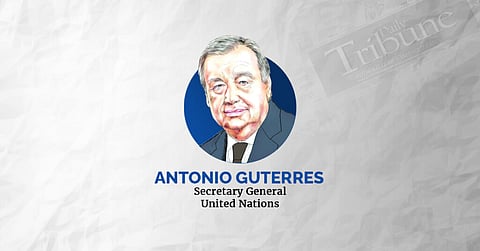
- NEWS
- the EDIT
- COMMENTARY
- BUSINESS
- LIFE
- SHOW
- ACTION
- GLOBAL GOALS
- SNAPS
- DYARYO TIRADA
- MORE

Biodiversity is the bedrock of life and a cornerstone of sustainable development.
Yet humanity is destroying biodiversity at lightening pace — the result of pollution, climate crisis, ecosystem destruction, and — ultimately — short-term interests fueling the unsustainable use of our natural world.
Biodiversity loss is a global challenge. No one country, however rich or powerful, can address it alone. Nor can they live without the rich biodiversity that defines our planet.
As we pursue sustainable development, we must transform how we produce and consume, and how we value nature, and deliver on the Kunming-Montreal Global Biodiversity Framework — the world’s blueprint to halt and reverse biodiversity loss. We need policies, regulations and other incentives to support sustainable livelihoods and build strong, green economies.
That means governments building on progress made at CBD COP16, including by delivering domestic and international finance, and shifting public subsidies and other financial flows away from activities that harm nature. And it means countries delivering National Biodiversity Strategies and Action Plans that put the Framework into effect, address inequality, advance sustainable development, respect traditional knowledge, and empower women, girls, Indigenous People and more.
As the theme of this year’s International Day reminds us, living in “harmony with nature and sustainable development” is humanity’s path to a better world for us all. Together, let’s take it.
***
I am pleased to send my warm greetings to this 78th World Health Assembly.
In a divided world, you are uniting behind a shared goal to promote health, keep the world safe and serve the vulnerable.
That is the longstanding mission of the World Health Organization (WHO).
And it is especially crucial at a time of deep reductions in funding for health and development — even while military spending reaches record highs.
Now more than ever, our world needs a coherent global health architecture that responds rapidly to crises and strengthens protection and wellbeing for all.
The Covid-19 pandemic highlighted deep gaps in collective preparedness — and served as a powerful reminder that no one is safe until everyone is safe.
The WHO Pandemic Agreement builds upon these lessons — and reflects the power of multilateralism in action.
After years of negotiation and compromise, you have come together to consider this landmark agreement, recognizing that global health emergencies demand global responses.
If adopted, this will be only the second international health convention under the WHO Constitution after the Global Convention on Tobacco Control, which came into force 20 years ago.
So I urge you to make history:
To strengthen global preparedness against pandemics;
To ensure equity and solidarity in responding to health threats;
And to uphold the promise of health as a fundamental human right — for this generation and the next.
But health is about more than emergencies.
The upcoming high-level meeting of the General Assembly on the prevention and control of noncommunicable diseases and the promotion of mental health offers a crucial opportunity to improve countless lives.
Progress towards Universal Health Coverage is essential to building resilient systems grounded in primary care — and delivering on the 2030 Agenda.
I also urge you to match ambition with resources — by strengthening investment in the World Health Organization and ensuring the sustainability and predictability it needs to build a healthier, safer and fairer world for all.
(United Nations Secretary-General Antonio Guterres’ messages on the International Day for Biological Diversity on 22 May 2025 and to the 78th World Health Assembly on 19 May 2025.)
